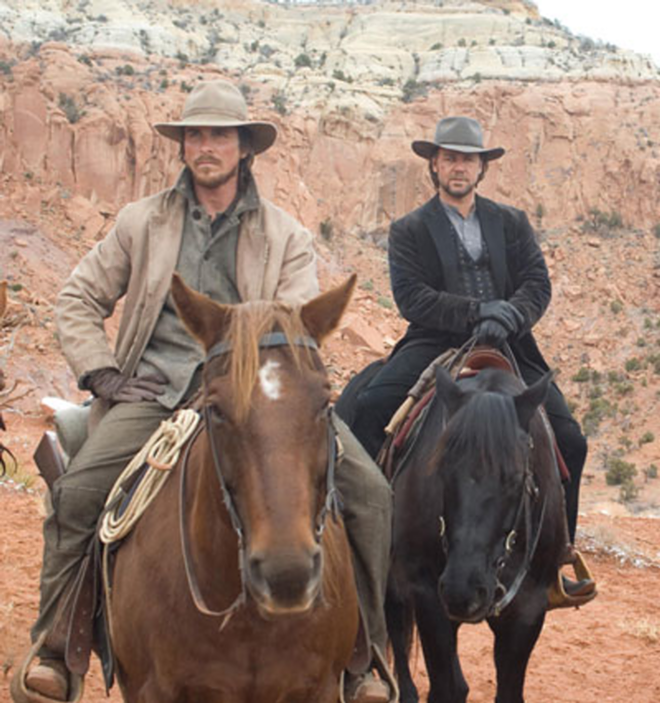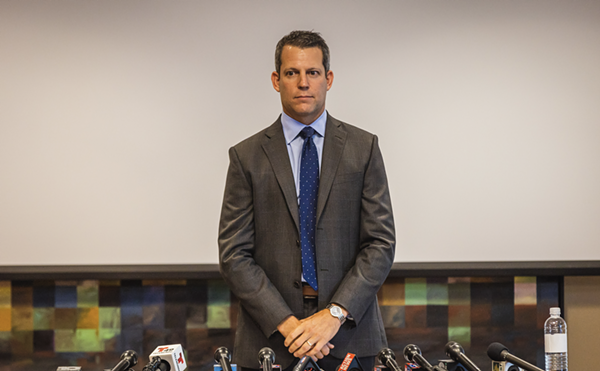
The alleged hero of 3:10 to Yuma wears a white hat, and the bad guy's hat is black, but don't let that fool you. In this early-21st-century Western, as in the 50-year-old oat opera on which it's based, shades of gray are the thing.
Everybody has their reasons in 3:10 to Yuma. Adapted from a short story by Elmore Leonard, both Yumas are hard-boiled Westerns suspended somewhere between the meaty, classic variety and the slipperier sort sometimes referred to as "psychological" — but perhaps even more accurately described, at least by men who eat quiche, as "existential."
The 1957 version of Yuma (plainly influenced by Fred Zinneman's classic High Noon, made five years earlier) snuck a touch of Camus into the Wild Wild West — the story of an ostensibly honest man abandoned by the traditional gatekeepers of society and left alone to uphold a moral code no one's particularly interested in upholding. It's essentially a two-man play in which "bad guy" Glenn Ford attempts to compromise "good guy" Van Heflin, who's already seriously alienated and hard pressed to make sense of a world that's discarded him.
The remake of 3:10 to Yuma lacks the original film's consistently claustrophobic focus (filmed in noir-ish black and white, the action in the '57 version takes place largely in a single, small room), but the new version sticks to its guns where it matters most. As in the original, this year's Yuma gives us a tightly wound cowboy adrift in an existential wilderness — Dan Evans (Christian Bale), a struggling rancher in danger of losing his land, his livelihood and the respect of his adolescent son. The guy's already lost a leg (a war injury he's suspiciously silent about), and the missing limb seems an unavoidably phallic metaphor for a man who feels increasingly emasculated. You can practically smell the anger bubbling up beneath his skin as life chips away yet another piece from the poor bastard.
The movie opens with Dan staring helplessly as bad guys burn down his barn — the archetypal man of peace impotent in the face of extreme violence — then cuts to his counterpart, notorious alpha-male outlaw Ben Wade (Russell Crowe). Wade is cocksure and lethal, but also peculiarly sensitive — partial to girls with green eyes, wildlife sketches and Scripture — and not without his own sort of moral code. A born killer, he does whatever it takes to get by, but he's also strangely loyal; Wade may even kill his own men from time to time, but only for committing the cardinal sins of weakness or stupidity.
Just to drive home the point that Dan and Ben are mirror images, the movie introduces both characters in identical Sergio Leone-inspired close-ups — tipped-down hat brim slowly raised to reveal the brooding eyes beneath — before eventually bringing them together. An odd twist of fate leads to Wade finally being apprehended by local lawmen, whereupon a financially strapped Evans picks up a few extra bucks by agreeing to help transport the outlaw to the nearest city, where he'll be put on the titular train and turned over to the Feds for hanging.
This is where the movie really begins to show its teeth, as catching that train turns out to be the kind of baptism-by-fire that pits neighbor against neighbor and lays souls bare, more often than not revealing a terrible void where a conscience should be. As Dan and his motley crew of makeshift jailers escort Wade to his date with fate, the journey becomes increasingly treacherous, forcing the guards to keep one eye on their unpredictable charge and the other peeled for the Apaches lurking behind every tree. And if any of these angst-ridden cowpokes had a third eye, it would already be bloodshot from watching for the inevitable assault by Wade's gang, waiting in the wings to free him.
Meanwhile, tensions simmer and occasionally boil over on the open range, with Wade playing Hannibal Lecter to his guards' collective Clarice. The outlaw taunts his captors with precision-tailored mind games, focusing the brunt of the psychological warfare upon Dan, of course, but taking time out now and again to show us that even monsters have their moments.
In between escape attempts (and murdering the occasional guard or two), Wade actually comes to the aid of his keepers at crucial instants, like when they're in danger of being overwhelmed by hostile outsiders. When the smoke clears, Wade sidles up to a guard who's earlier made the mistake of insulting him and announces, "Even bad men love their mamas," and summarily shoves him off the nearest cliff.
As the storm clouds gather and 3:10 to Yuma heads toward its big showdown, the balance tips in Wade's favor, and the movie's entire stable of heroes reveal themselves as rats deserting a sinking ship. Everyone has his price, and when Wade's gang turns up offering all good citizens cash to look the other way, morality flies out the window, setting the stage for Ben's mano a mano with last-man-standing Dan.
The movie drops the ball a bit in the end, repeating the mistakes of the original Yuma by resorting to some 11th-hour backpedaling and pandering — Bale redeems himself in the eyes of his son and even achieves a sort of coffee-klatsch bonding with Crowe — but that's almost to be expected. James Mangold (Walk the Line, Copland), a smart and commercially savvy director, surely realized that without at least a glimmer of light at the end, audiences would never be able to bear all the surrounding darkness.
Last-act problems aside, 3:10 to Yuma is a solid piece of work, a Western respectful of old-school conventions while breathing some new life into the form. Mangold stuffs the movie with interesting characters played by quality talent — notably old hand Peter Fonda and new-ish face Ben Foster, terrific as Wade's sadistic henchman — and Bale, beefed up to Batman-esque proportions again, is a worthy match on all fronts for the charismatic Crowe.
It's tempting to wonder if the movie might have played even better had Bale and Crowe exchanged roles (they're certainly capable of it), and even more interesting to ponder the implications of an Aussie and a Welshman as the "American" stars of a 21st-century Hollywood Western. But that's about as close as you'll get to subtext here.

















